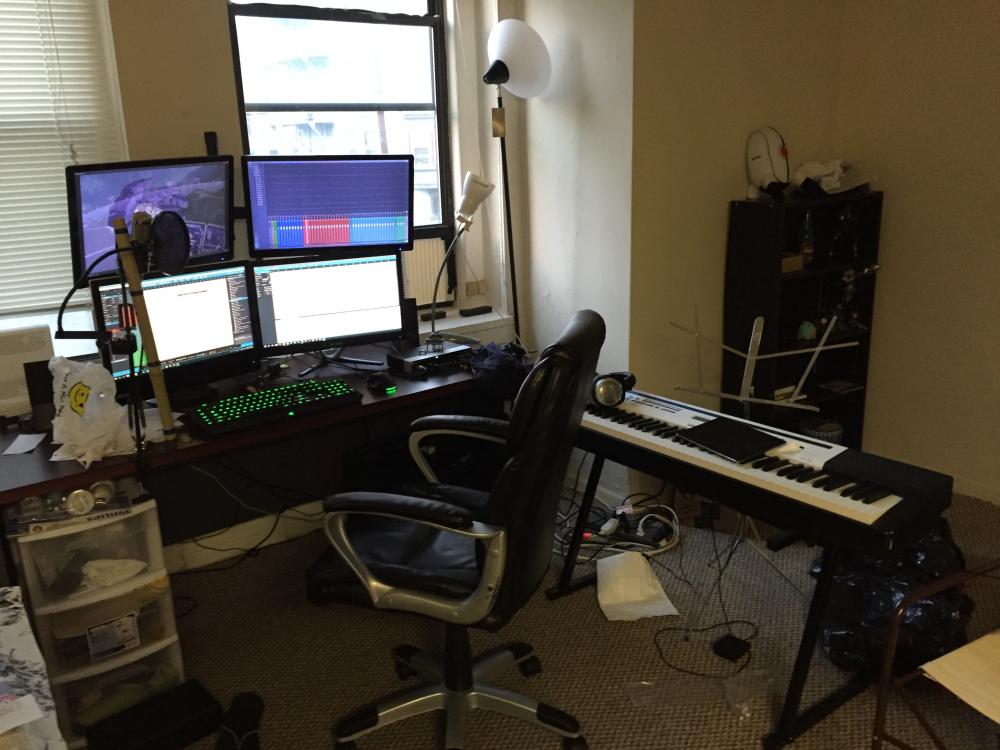Leaderboard
Popular Content
Showing content with the highest reputation on 09/16/2016 in all areas
-
I don't really agree with the whole "it needs time to set in people's minds, and then it will be as iconic" argument. I remember when The Phantom Menace came out in 1999, me and all my friends were humming "Duel of the Fates" out of the theater. I had Frodo's Theme and The Ring theme stuck in my head for weeks after seeing The Fellowship of the Ring for the first time. More recently, I was humming "Rey's Theme" after my first and only viewing of The Force Awakens, and that isn't even close to one of Williams' best or most iconic themes. And Fellowship wasn't even a saga yet, and while Star Wars was, those particular themes were completely new. Also, this has been mentioned by someone else on another forum regarding the same video, but composers don't really seem to be into developing thematic material anymore. That doesn't mean there aren't themes, and it also doesn't mean that you don't hear the themes come up multiple times in the movie/series. But look at the Force Theme from A New Hope: you first hear it in a lonely, intimate sort of way as Luke stares out over his bleak existence, hopeful for something more. Then, throughout the original trilogy, you hear it grow and develop with Luke, almost as if it's maturing with him. In today's films, it seems very much that "incidental" music is the norm. "That track fits this scene, this next track fits this scene, moving on." It's very much A to B and that's it. If you do hear a theme reappear later, it's often just copy and pasted from before instead of changing and maturing with the story. Or it's some piano version to impart "intimate", or a string ostinati version to impart "heroic". Also, it seems that with the ADHD attention spans that movies are catering to, there's just so much action that there's hardly any time for developing thematic material. It's just gut-pounding action cue from wall to wall, with very little time devoted to developing characters and focusing on real emotion, much less the themes to go with them.2 points
-

Game Collections - waste of money or valuable investment?
TheChargingRhino reacted to The Nikanoru for a topic
Recently, someone told me that I have 'wasted money' buying games when I could have used the money for 'better things.' When I was growing up, I had very few games to play (mainly because my folks were haters), but the games I did have I played over and over again just to squeeze every bit of enjoyment I could out of them. I bought my first SNES which I bought with my own money on August 24th, 1994 - including Super Mario World - and I have been building my collection ever since. I now own about 140 hard copy games ranging from SNES to PC to PS3, 6 consoles, and 200+ soft-copies of games for both PSN download, PC games, and emulation ROMs... and let me tell you, I love my games and value them highly. I can still get excited hearing a Mega Man boss intro, listening to the intro to the boss theme in Link to the Past, or listening to the opening Corneria theme in Star Fox. I like to game for many different reasons, but they reason I tell most people is because I liken playing a video game to reading a book - an interactive book which to have to work at to see the next page and build your understanding along with the characters. I like playing the same game more than once, not just for the nostalgia of experience, but also because you never get everything a game has to offer with one play-through. For example, I played SaGa Frontier for the first time in 2000 and I HATED the game. Too confusing, no directions, battle system frustrating. So I put it down - but I didn't sell it. Three years later, a buddy of mine told me he had a copy of the strategy guide and let me leaf through it. Suddenly armed with a little bit of knowledge, I picked up the game again and this time, I got it. Seven different plots, lots of different ways to develop characters, open-ended setup to build them and your story how you want them to be. Today, SaGa Frontier remains one of my favorite games (Asellus' story rules!) and I still pick it up from time to time. Most of the friends I had who were gamers growing up have either stopped playing regularly or long since left gaming behind. When I talk to gamers who are younger than I, most of them don't own more than 5 or 6 games at one time, because they tend to trade them in after they're bored with it or they've beaten it once. Mainstream game stores rarely if ever carry games older than the current generation of console, because no one wants to hold the inventory. It seems that most people treat gaming as a 'plug in, play, then throw away' activity these days - and to me, this is disappointing considering all of that effort that when into the development and release of a unique story. Even nostalgia gaming isn't as popular for the PS2 or the Saturn as it was for the NES/SEGA or SNES/Genesis eras - old-school game stores in my area have tons of old PS2/X-Box games these days. My questions: Does anyone else feel the same way? Are there any other collectors out there? Does anyone else still enjoy playing older games? Or has gaming really become so disposable? Am I the curator of a library that no one cares about anymore but me?1 point -
1 point
-
FALLEN: An Undertale Tribute album from Materia Collective
TheChargingRhino reacted to KaS for a topic
I need to find a time to listen to this all. So hyped! I picked a track at random for now, and Uwa! Mega Temperate is my favorite thing now.1 point -

Megaman X - Boomer Kuwanger - Kuwanger in a Trance
The Nikanoru reacted to Starphoenix for a topic
As always I appreciate the feedback. With your advice I added a phaser effect that goes in and out on the lead. Tried to balance keeping some consistency and variety. Hopefully it pans out as well as my earbuds led me to believe. Also think the EQ is starting to mold closer to how I hoped it'd sound. All this to say... Here is version 6. Hopefully this is getting closer to OCRemix-quality.1 point -

The Marvel Symphonic Universe
Bleck reacted to Nabeel Ansari for a topic
I think Bleck's right, in that I think this has to do with entertainment industry in general slowly approaching a state of (unjustly) hyper-optimized being. Everything is more efficient, easier, faster, more productive; as a result, patience is thrown out the window, we cut to temp scores; taking risks is subconsciously considered inefficient, and therefore something that needs to be cut out of the process.1 point -

OCR Cribs (the "Post Pics of your Studio Area" thread!)
TheChargingRhino reacted to APZX for a topic
My space after recently getting around to actually setting it up. Not complete, but it works for the moment. Starting off with the DAW itself. A couple of HP ZR22w monitors, Neumann KH120A for monitoring, a Drawmer MC2.1 monitor controller, Focusrite Saffire Pro 24, and a pair of VU Meters from Crookwood. The computer itself is a custom built rig (i7 4770k, 32GB RAM, GTX 780, 256GB SSD, 2TB HDD, 2x 1TB HDD, in a Fractal Design Define R4). You can see the side of it on the bottom left. It is a really plain looking computer. However, when I turn around is when things get fun. Two tier keyboard stand with a Roland SH-201 and a Korg DS-8 (this thing actually needs work: new battery, keybed cleaned due to some sticky keys, Sysex dump, etc . . .) Synth rack! From top to bottom: Korg Radias, Roland D-110, 2x Yamaha TX81z, Korg TR Rack, E-MU Pro/Cussion, and finally an Access Virus Rack at the very bottom. Other synth rack, well more like a single synth and a patchbay (currently unutilized as I need to think of the best way to use it). The synth for this one is a Vermona DRM1 mkIII. Synth table!!! So, at the bottom is a 22-space Synthesizers.com Modular. Pretty much the Studio 22 one except with the addition of a Q167 LFO++ Module for a bit more modulation options. The top left is a Ladyada x0xb0x (TB-303 clone). Currently attached to it is a ProCo Rat for some Acid. I also have a Boss MT-2 that isn't pictured, but it is chilling to the right of the Alesis QX25. In the middle is a Dave Smith Instruments Mopho. You could see just a little bit of this guy in the last picture, but this is my mixer a 40+4 Channel SoundCraft Series Two (nicknamed Priscilla by the person who helped me to lift it because it weighs about 150lbs or 68kg and is the better part of 5ft wide or 1.5m). To my ears, generally neutral, pretty quiet, and ample headroom (can handle more level than my converters). And behind me is basically the DAW. Though I forgot to snag a picture of it, the rack between the mixer and keyboard stand is a processing rack. From top to bottom: Alesis MIDIVerb IV (Multi-effects), Kurzweil Rumour (basically a reverb machine), 2x Symmetrix CL-150 (compressors), Alesis 3630 (compressor), Alesis MicroVerb III (multi-effects), ART Pro VLA II (compressor), and finally a patchbay that is being used . . , yay? Under the mixer are its power supplies. And no you don't want to know the amount of cabling that went into this. All synths are controlled via MIDI and to do that I'm utilizing an Alyseum AL-88c which is behind the modular. And this is also why I haven't been working on my track Odai (sorry ).1 point -

FALLEN: An Undertale Tribute album from Materia Collective
TheChargingRhino reacted to jmr for a topic
Pick your poison: https://www.youtube.com/user/ferdk16 https://www.facebook.com/ferdk https://twitter.com/Ferdk1 point -
Again, sorry to bombard you with suggestions. You clearly know what you're doing here with the instruments. Looking forward to seeing how the mix develops. Also, nice marketing of the second track!1 point
-
1 point
-

What makes video game developers pay for music?
Nabeel Ansari reacted to WillRock for a topic
No. No no no no no. nuuuuuuuuuuu. This is the one thing you must NEVER do, in my experience. NEVER undersell. Ever. If you're worried about "starting at the bottom and doing it for free and peanuts"... the music should speak for itself. If they like your music, they'll consider you. Doesn't matter how much work you've done in the past, if your music is what they want, they'll pay. Ultimately, doing it for free undervalues your work. Yes seems simple but it does undervalue the work, both for you and the developer, but most importantly, everyone else. See, right now, there is this general consensus from a lot of indie developers that music isn't work paying for. Know what happens when developers don't pay for music? 3 potential things. 1: Musicians actually do a good job and get screwed cause they did all that work for nothing. 2: They do a half-assed job. I once saw a track from a guy in this community on a game I helped score... it was pretty bad. Like... sample quality and mixing were vastly lower than what the developer was asking for. I looked up his stuff on youtube. Was better than what I could do, really high quality, great samples, humanisation and mixing. Asked the developer, he said the guy worked for free and was busy. 3: They just... disappear on you. This is something that developers tell me happens all the time with free people and honestly, why wouldn't it happen? They realise they don't get anything out of it, they're busy with life and just fuck off. Sad but true. See, it gives this idea that not only is music not worth paying for, but people don't give a shit anyway. I've managed to get paid gigs from people who said they only do free simply based on the fact that I promised to keep in contact and do a good job, and of course, when i've stuck to my word, they've kept me around. Depends how savvy the developer is on the whole situation tho. You pay for what you get, and if you tell them that, they'll be 90% more willing to pay you. NEVER undersell yourself.1 point -

OCR Cribs (the "Post Pics of your Studio Area" thread!)
TheChargingRhino reacted to Nabeel Ansari for a topic
1 point -

What makes video game developers pay for music?
Thirdkoopa reacted to dannthr for a topic
The biggest mistake a dev can make is concealing their budget from the person they're entrusting with their audio vision. Unfortunately, a lot of devs "shop around." Treat yourself with some respect but be objective and sincere about what price will yield your best results. You can't deliver a killer soundtrack if you're on your third week of revisions for a single minute loop and you're now realizing that you're getting paid about 3 bucks an hour to write it. Think about your skill level, be honest in your evaluation of how well produced/professionally produced your music is (as honest as possible) and come up with an optimistic fee, be open to negotiation and maintain a firm minimum. If you have no credits, then money is probably not your primary objective for the work, that's important to evaluate as well. I definitely charged low when I was starting out, never charged as low as $100/min, but low. I had my minimums and sometimes that meant it didn't work out. Sometimes that meant the dude who was charging $50/min got the job, but they almost always SOUND like it too. I knew a guy who was trapped in $50/min, couldn't seem to work his way out, kept getting gigs by low-balling and then he grew a customer base of cheap devs looking for the bottom line. He was not happy with the work he did and he had to do a high volume to maintain a steady income, so he burnt up all his creative juices just trying to churn out 40-60 minutes a month just to pay the bills. Most importantly: NEVER, EVER POST YOUR RATES ANYWHERE--JUST DON'T DO IT. All rate discussions should be kept private in undisclosed email conversations with your client. The client will want you to disclose a rate immediately, but you cannot honestly estimate a rate if you do not know what kind of music you'll be writing, what the scope or duration of the project is, whether your client is expecting any live musicians, what KIND of production they're expecting from you, etc., etc., etc. It's not about holding something back from the dev, it's about being honest about what rate will yield your best results.1 point -

OCR Cribs (the "Post Pics of your Studio Area" thread!)
TheChargingRhino reacted to Kat for a topic
Nothing too fancy. An Oxygen49 keyboard, BX5a monitors and a Scarlett Solo interface all crammed into a tiny room.1 point -

OCR Cribs (the "Post Pics of your Studio Area" thread!)
Astra Cat reacted to AngelCityOutlaw for a topic
Here I always imagined you as one of those guys with the giant-ass control rooms1 point -
New place, new studio pic! And the new DJ rig:1 point
-
OCR Cribs (the "Post Pics of your Studio Area" thread!)
Astra Cat reacted to Patrick Burns for a topic
studio - freshman edition When I'm in the mood, I push stuff around, pull out my 49-key keyboard, set it on my lap, and fire up logic.1 point





